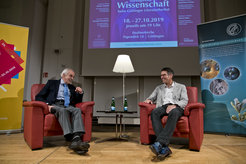Martin Wikelski wins Science Communication Medal 2019
The medal was awarded in Göttingen by the Max Planck Institute

Martin Wikelski received the Science-Communication-Medal of the Göttingen Max Planck Institutes at the beginning of the Literature Autumn season. The professor and director of the MPI for Ornithology in Radolfzell impressed after the award by his friend Prof. Herbert Jäckle with his exciting "Internet of Animals."
Behind the eye-catching title, a fantastic, unique and earth-shattering project opened up with an equally striking abbreviation: ICARUS. It stands for a global satellite-based system for the observation and location of animals - ranging from turtles to white sharks to smaller species such as songbirds, bats, moths or even tiny insects. They are all equipped with different sized and heavy transmitters. The lightest are currently five grams and should be further relieved: "One gram" is Wikelski as a development goal. So even bees or flies could carry the solar-powered mini-computer on their backs.
Learning to understand animals
But why all the effort? "We want to recognize migrations of the animals, but also to recognize and understand how the animals interact with each other." How does another migrant bird learn from the neighbor when the start of the large formation train begins over several thousand kilometers so that he does not miss it?
The enthusiastic biologist and ornithologist Wikelski also wants to get an answer to this question. Ultimately, things are even bigger: Wikelski and Co. want to find out more about the animals in the world, habits, abilities that are often already known today but can not be explained and often can not be interpreted.
Tips from "experts"
Observations on site are often not enough. "Then it is said that the birds or the turtles can not be seen for a short time, that's normal," says Wikelski and comes up with astonishing insights: Instead, they flew thousands of kilometers or two turtles on the Galapagos Islands Went off points at the same time and met after a tour around a volcanic crater at the sea. Wikelski tells this enthusiastically. There is a scientist in the Paulinerkirche, which is filled to the last seat, and the work is a lot of fun and, on top of that, can convey everything wonderfully.
Data to the ISS
But as a project manager, he is by no means above all: Wikelski likes to take part in all over the world, as the photos confirm: He captures giraffes and moths, sets the channels, looks for scientists who want to participate in ICARUS - and listens to Sicilian Farmers when it comes to finding the animals that could be the best harbingers of a pending Etna outbreak. Yes, even natural disasters, weather phenomena, crop failures and the spread of diseases should be decrypted.
Humboldt's dream
Wikelski is also there, when with the launch of a Russian Soyuz carrier rocket from the Baikonur space station the module for the processing and forwarding of the signals sent by the animals to the space station ISS goes on the journey.
(translation based on the article https://www.hna.de/lokales/goettingen/goettingen-ort28741/preistraeger-wikelski-und-kurztripp-stockenten-nach-petersburg-13134752.html by Thomas Kopietz)
